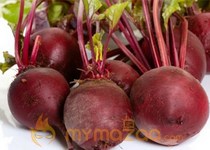Daily consumption of beetroot juice for four weeks significantly lowered blood pressure in hypertensive patients compared with a placebo juice, according to a report in the February issue of Hypertension.
Beetroot juice also helped to relax arteries and improve blood-vessel function.
Beetroot juice, or beet juice, is made from the root of the beet plant beta vulgaris. Compounds in beets called dietary or inorganic nitrate enter the circulation in swallowed saliva, where some are converted to nitric oxide, a powerful vasodilator, or blood-vessel regulator, the study said. Plant-based nitrate is different from sodium nitrate, a type of salt used to cure meat.
From 2011 to 2013, researchers in the U.K. recruited 64 patients, 26 men and 38 women in their mid-50s. Although some were taking blood-pressure medication, all had uncontrolled or persistent hypertension.
Half of the subjects consumed an 8-ounce bottle of beetroot juice the same time every morning, while the other half received the same amount of beetroot juice, with nitrate removed.
Blood pressure was measured daily at home, during clinic visits and with 24-hour continuous monitoring.
Over the study period, systolic blood pressure, the top blood-pressure number, decreased from 7.7 to 8.1 points in subjects that received dietary nitrate. Diastolic blood pressure, the bottom number, decreased 2.4 to 5.2 points.
Both systolic and diastolic pressure started to return to pre-study levels within two weeks of consuming the last bottle of beetroot juice. No blood-pressure changes were recorded in the placebo group.











